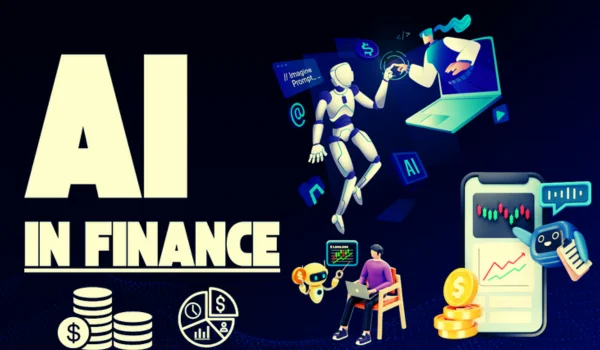The finance department isn’t what it used to be. Gone are the days when teams spent endless hours poring over spreadsheets, reconciling transactions, and manually updating forecasts. Artificial intelligence (AI) has moved from buzzword to business backbone—particularly in finance.
Whether you’re a CFO, an accountant, or a business owner curious about where technology is taking the numbers game, one thing’s clear: AI is changing how financial decisions are made, reported, and even predicted. And it’s happening faster than most expected.
The Rise of AI in Finance: From Experiments to Everyday Tools

Finance teams have been using automation tools for years, but AI takes things further. It doesn’t just automate—it learns, analyzes, and predicts.
According to the KPMG Global AI in Finance Report, 71% of companies are already using AI in their finance operations. Even more telling, 41% say they rely on it to a “moderate or large degree.” For the so-called “AI leaders,” 95% expect to use generative AI (GenAI) in financial reporting within three years. That’s a massive shift toward smarter finance.
So what’s behind the momentum? AI’s ability to handle massive data volumes, uncover insights hidden in patterns, and improve decision-making—faster and more accurately than humans ever could.
How Finance Teams Are Using AI Today
Let’s look at where AI is making the biggest impact right now. Spoiler: it’s everywhere.
- Automating Accounting Tasks
AI-powered accounting platforms are now doing what once took full teams—data entry, reconciliation, and even fraud detection. These systems process invoices, match transactions, and flag anomalies automatically.
A practical reference can be found in this roundup of AI examples in accounting, which showcases tools that automate journal entries, invoice processing, and audit readiness.
AI doesn’t just speed things up—it reduces errors. Machines don’t get tired at 3 a.m., and they certainly don’t miss decimal points.
- Predictive Forecasting and Scenario Modeling
Finance teams used to build forecasts manually, often using outdated assumptions. Now, AI models analyze real-time financial data, economic indicators, and even market sentiment to produce far more accurate projections.
In McKinsey & Company’s study, 44% of CFOs said they were already using generative AI for at least five use cases by 2025—up from just 7% a year earlier. That’s a 6x increase in a single year.
Even better? 65% of respondents said their organizations plan to increase investment in GenAI tools in 2025. The message is clear: predictive capabilities aren’t just nice to have—they’re becoming indispensable.
- Financial Analytics and Insights
AI-driven analytics platforms are redefining how finance teams interpret data. They can sift through millions of transactions and identify performance trends, cash flow patterns, or risk exposures in seconds.
Rather than spending time on report generation, analysts can focus on strategy. AI handles the grunt work—humans handle the interpretation.
Why Finance Leaders Are Betting on AI
So, why the rapid adoption? Let’s break it down.
Smarter Decision-Making
AI’s ability to learn from data means finance leaders can base decisions on evidence rather than instinct. Whether it’s deciding when to hedge currency risk or how to allocate capital, AI-driven insights often lead to better outcomes.
Time and Cost Savings
Automation isn’t new, but AI-powered automation scales better. A report by the World Economic Forum found that a majority of financial services firms expect AI to cut operational costs significantly over the next few years. That’s not surprising when systems can perform in seconds what would take analysts hours.
Enhanced Accuracy and Compliance
With finance functions under tighter regulatory scrutiny, AI can be a safeguard. Machine learning models spot inconsistencies, flag compliance risks, and keep audit trails intact—all while learning from historical data to improve over time.
Data-Driven Confidence
When numbers are accurate and insights are timely, confidence grows. AI delivers exactly that. Finance leaders gain clarity into performance metrics that were previously too complex to track manually.
The Reality Check: ROI and Results
Of course, not every AI project leads to measurable success. The Boston Consulting Group (BCG) reports that only 45% of finance executives can actually quantify the ROI from their AI or GenAI initiatives. Among those that can, about one-third report returns under 5%, while one in five enjoy a 20%+ ROI.
Why the variance? Implementation. Many finance teams underestimate the time and data quality needed to train AI systems effectively.
And as McKinsey notes, only about 5% of AI pilots have translated into meaningful profit-and-loss impact so far. The promise is there—but realizing it takes planning, integration, and continuous refinement.
The Human Element: What Changes for People?
AI doesn’t eliminate finance professionals—it elevates them. As machines handle repetitive tasks, finance teams shift toward interpretation, strategy, and business partnering.
Upskilling and Adaptation
The Deloitte and IMA report reveals that 16% of finance professionals are already using or adopting generative AI, and 44% plan to adopt it within five years. That means over half of the industry will be working alongside AI soon.
This shift demands new skill sets—data literacy, AI comprehension, and ethical oversight. Accountants and controllers are learning to question algorithms as much as they once questioned balance sheets.
Collaboration Over Replacement
AI systems can summarize reports, detect anomalies, and even predict outcomes—but they can’t yet handle the nuances of business context. Human judgment remains vital, especially in interpreting data through a strategic lens.
In short, AI takes care of the “what.” Humans still decide the “why.”
Risks and Ethical Considerations
Every innovation brings challenges, and AI in finance is no exception. Here’s what’s keeping CFOs up at night.
Data Privacy and Security
Finance teams handle some of the most sensitive information in any organization. Feeding this data into AI systems raises questions about privacy and access control. Even anonymized data can be at risk if models are not properly secured.
Bias and Decision Fairness
AI is only as unbiased as the data it learns from. If historical financial data contains biases—say, in credit decisions or vendor selection—AI could perpetuate them. That’s a serious concern for compliance and reputation alike.
Overreliance on Automation
When algorithms perform well, it’s tempting to trust them blindly. But AI models can drift, especially in volatile markets. Continuous human oversight is non-negotiable.
Regulatory Uncertainty
As noted in the World Economic Forum’s white paper, the number of AI-related regulatory and operational risk incidents increased significantly between 2022 and 2024. Governments and regulators are catching up, but the pace of policy development still lags behind the technology itself.
What the Future Looks Like
Here’s what’s on the horizon for finance teams embracing AI.
Generative AI for Reporting and Analysis
Expect GenAI to become a standard tool for creating reports, writing financial summaries, and explaining anomalies. According to KPMG’s findings, nearly 95% of leading adopters plan to integrate GenAI into their reporting workflows by 2028. That’s not a prediction—it’s a roadmap.
Continuous Forecasting
Static budgets are fading away. AI systems will soon update forecasts automatically as new data flows in—from ERP systems, CRM platforms, or even macroeconomic indicators. The result? Rolling forecasts that reflect business reality, not last quarter’s assumptions.
Real-Time Risk Management
AI will make real-time risk tracking the norm, not the exception. Systems will continuously evaluate credit exposures, liquidity risks, and fraud signals. Finance leaders will move from reactive to proactive decision-making.
Integration with Broader Business Strategy
The finance function is evolving into a strategic partner for every department—from marketing to operations. AI-enabled analytics will help quantify the financial impact of every business initiative, in near real time.
Bringing It All Together
AI isn’t replacing finance—it’s redefining it. From automating accounting to enhancing forecasting and analytics, the technology is giving finance leaders tools that were once unimaginable.
But technology alone isn’t enough. True progress comes when humans and machines collaborate—when CFOs use AI insights to drive smarter strategy, not just faster reporting.
The statistics make it clear:
- 71% of companies are already using AI in finance operations (KPMG).
- 65% of CFOs plan to increase AI investments this year (McKinsey & Company).
- Only 45% can currently measure ROI (BCG)—but that’s improving as adoption matures.
For finance professionals, that means opportunity. The next decade won’t just be about managing the numbers—it’ll be about interpreting what those numbers mean in a world run by algorithms.
And the smartest businesses? They’ll be the ones that learn how to make AI not just part of finance—but part of their DNA.



